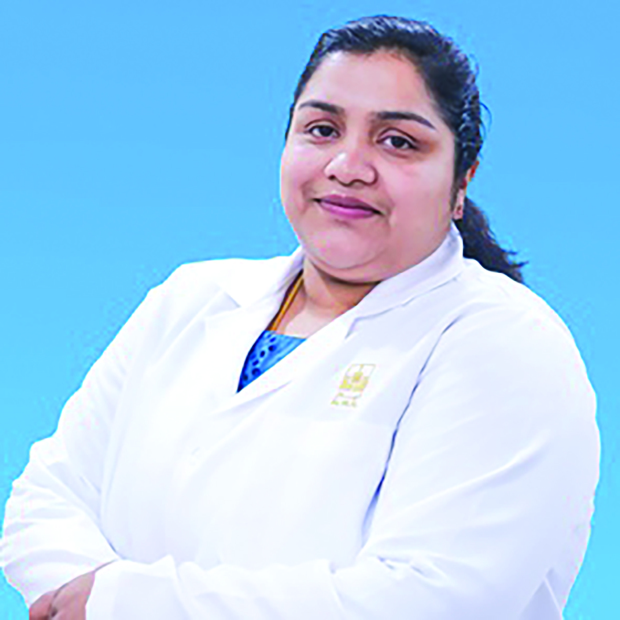Lactation consultations and antenatal counselling are on the rise in Bahrain, a medic has highlighted, coinciding with World Breastfeeding Week from August 1 to 7.
The positive shift points not just to the kingdom’s efforts to raise awareness about breastfeeding but also the active role of the healthcare sector in providing support to the mother and child during the nursing phase, which is a major area of focus this year, according to the World Health Organisation (WHO).
“The national breastfeeding committee under the Health Ministry has been focused on accelerating TOT (training of trainers) training – a 20-hour breastfeeding certification – for healthcare professionals. Many hospitals are doing their own internal trainings as well to increase the number of lactation consultants,” Royal Bahrain Hospital family medicine and international lactation consultant Dr Fajer Nasser told the GDN.
Dr Nasser
“It’s for healthcare professionals including midwives, nutritionists and pharmacists – anyone who has more than 80 per cent dealings with the mother and child. The certification equips them to guide patients on their breastfeeding journey,” she added.
Additionally, hospitals across Bahrain are increasingly offering antenatal classes to educate expectant mothers about breastfeeding and its benefits.
Dr Nasser pointed to collaborations with the Bahrain Nursing and Midwifery Society to conduct the trainings.
“The national breastfeeding committee also plans to extend the training to Master’s students pursuing medicine, so we start the education at the base level,” added the expert, who attended a breastfeeding conference staged by the Health Ministry yesterday.
The event featured talks on related topics, including the properties and benefits of breastmilk and, inducing herbal substitutes to help increase milk supply and safe medication while breastfeeding, among others.
World Breastfeeding Week has been observed since 1992.
However, it has been aligned with the United Nations Sustainable Development Goals (SDGs) since 2016 and is co-ordinated by the World Alliance for Breastfeeding Action (WABA). This year’s theme is Prioritising Breastfeeding.
WABA is a global network of individuals and organisations dedicated to the protection, promotion and support of breastfeeding worldwide, aligned with WHO and the United Nations Children’s Fund (Unicef).
The national breastfeeding committee’s programmes are in keeping with Bahrain’s participation in the WHO and Unicef Baby-Friendly Hospital Initiative (BFHI), a global effort, launched in 1991. It was based on integrating the ‘Ten Steps to Successful Breastfeeding’, which protect, promote and support breastfeeding in facilities providing maternity and new-born services.
The global exclusive breastfeeding rate stood at 48 per cent in 2023, close to the World Health Assembly target of 50pc by 2025; the new 2030 target is 70pc.
“Unfortunately, it’s a lot less in the Gulf region, however, we’re positive that the continuous efforts and all the initiatives will help us to improve this figure,” Dr Nasser added.
Indian expatriate and mother-of-one Sowmya Sreejith remembers her physician encouraging her to breastfeed despite the minor inconveniences that accompany newfound motherhood.
“I had read a lot of material on breastfeeding and attended the three-day antenatal classes organised by the hospital, but when I actually had to breastfeed my son, I had some challenges with the positioning,” said the 39-year-old, who exclusively breastfed her baby Avyaan Sreejith for six months and then continued to mix feed for two years.
Exclusive breastfeeding means that the infant receives only breast milk. No other liquids or solids are given – not even water – with the exception of oral rehydration solution, or drops/syrups of vitamins, minerals or medicines.
“I had read about the ‘football hold’ but didn’t remember it when the time actually came. Luckily, my mother suggested I try it and it helped. Breastfeeding involves a lot of trial and error and isn’t as ‘natural’ a process as it’s made out to be. New mothers need all the guidance and help they can get,” added the Juffair resident, commending the kingdom’s initiatives towards the cause.
Al Hilal Premier Hospital obstetrician and gynecologist Dr Saumya Jose said Bahrain was witnessing ‘a positive shift in favour of exclusive breastfeeding as the mothers were now becoming more aware of its benefits’.

Dr Jose
In addition to the healthcare training programmes, other national initiatives that show Bahrain’s strong commitment to protecting and promoting breastfeeding include supportive legislation and women support groups.
“Bahraini labour law grants working mothers paid maternity leave and daily breastfeeding breaks for two hours for up to two years postpartum, facilitating the continuation of exclusive breastfeeding,” Dr Nasser said, adding that women’s groups like the Supreme Council for Women, which is a major national policy driver, play a key role in integrating breastfeeding support into broader women’s empowerment strategies.
“Additionally, the kingdom enforces the International Code of Marketing of Breastmilk Substitutes, restricting unethical formula advertising and safeguarding infant health.”
melissa@gdnmedia.bh


&uuid=(email))